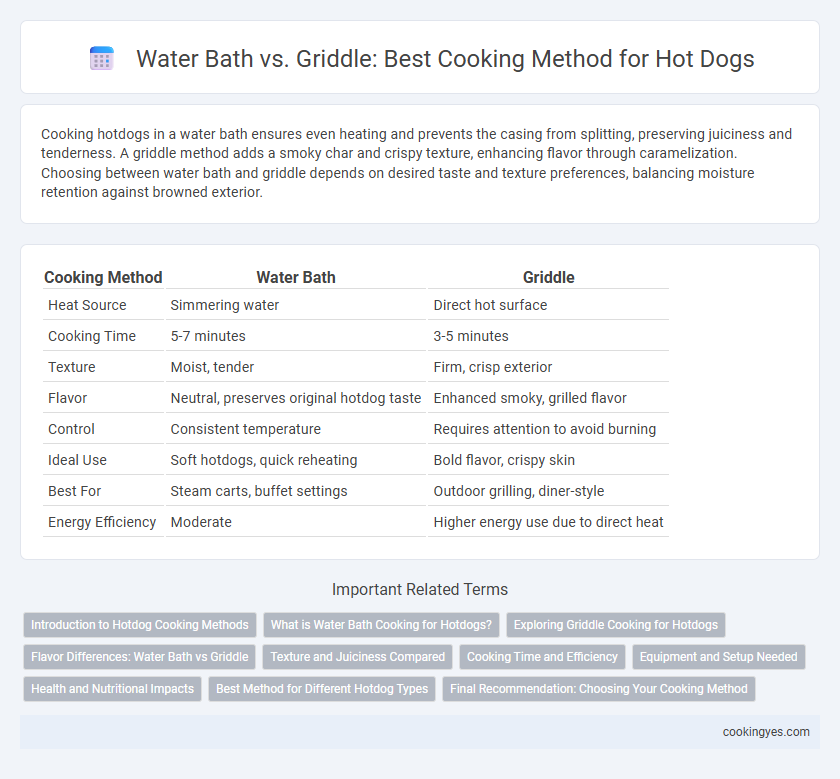Cooking hotdogs in a water bath ensures even heating and prevents the casing from splitting, preserving juiciness and tenderness. A griddle method adds a smoky char and crispy texture, enhancing flavor through caramelization. Choosing between water bath and griddle depends on desired taste and texture preferences, balancing moisture retention against browned exterior.
Table of Comparison
| Cooking Method | Water Bath | Griddle |
|---|---|---|
| Heat Source | Simmering water | Direct hot surface |
| Cooking Time | 5-7 minutes | 3-5 minutes |
| Texture | Moist, tender | Firm, crisp exterior |
| Flavor | Neutral, preserves original hotdog taste | Enhanced smoky, grilled flavor |
| Control | Consistent temperature | Requires attention to avoid burning |
| Ideal Use | Soft hotdogs, quick reheating | Bold flavor, crispy skin |
| Best For | Steam carts, buffet settings | Outdoor grilling, diner-style |
| Energy Efficiency | Moderate | Higher energy use due to direct heat |
Introduction to Hotdog Cooking Methods
Water bath cooking for hotdogs ensures even heating and moisture retention, resulting in juicy and tender hotdogs. Griddle cooking imparts a crispy exterior and charred flavor through direct contact with a hot surface. Choosing between water bath and griddle methods depends on desired texture and flavor preferences for perfect hotdog preparation.
What is Water Bath Cooking for Hotdogs?
Water bath cooking for hotdogs involves submerging the sausages in hot water maintained at a controlled temperature, typically around 160-180degF (71-82degC), to gently heat and evenly cook the meat without drying it out. This method preserves moisture and texture, making hotdogs juicy and tender compared to high-heat methods like griddling. Maintaining precise water temperature ensures safe cooking while preventing the casing from bursting.
Exploring Griddle Cooking for Hotdogs
Griddle cooking for hotdogs delivers a crispy exterior and enhanced caramelization, elevating flavor compared to the moist texture from water bath methods. The high, direct heat of griddles sears the hotdog skin, intensifying Maillard reactions for a savory, grilled taste. This technique is favored in restaurants and street vendors aiming for a bold, textured hotdog experience over the gentle, uniform heating from water baths.
Flavor Differences: Water Bath vs Griddle
Cooking hotdogs on a water bath preserves juiciness and results in a tender texture by gently heating without direct contact, which minimizes browning and caramelization. In contrast, using a griddle imparts a smoky, charred flavor through Maillard reactions, creating a crisp exterior and enhancing savory notes. The choice between methods significantly influences the hotdog's flavor profile, with water baths offering mildness and griddles delivering robust, complex tastes.
Texture and Juiciness Compared
Cooking hotdogs in a water bath preserves juiciness by gently heating the sausage, preventing moisture loss and maintaining a tender texture. Griddle cooking, in contrast, enhances flavor through caramelization and crisps the casing, offering a slightly firmer bite with a smoky char. For optimal texture and juiciness balance, a combination of water bath followed by brief griddle searing is often preferred.
Cooking Time and Efficiency
Cooking hotdogs using a water bath typically requires 5 to 7 minutes to heat thoroughly, offering consistent moisture and preventing drying out while maintaining energy efficiency due to lower heat settings. Griddle cooking, though faster at around 3 to 5 minutes, provides a crispy exterior with direct contact heat but consumes more energy and requires constant monitoring to avoid burning. Efficiency-wise, water baths excel in volume cooking with minimal supervision, whereas griddles deliver superior texture for small batches at the cost of higher energy use.
Equipment and Setup Needed
Water bath cooking requires a specialized steam table or water bath cooker to maintain consistent temperature and moisture, ideal for preparing large quantities of hotdogs evenly. A griddle setup involves a flat, heated metal surface with adjustable temperature controls, offering direct contact for crisping and browning the hotdog exterior. Equipment choice depends on desired texture, volume needs, and kitchen space, as water baths excel in moisture retention while griddles provide quick, high-heat cooking.
Health and Nutritional Impacts
Cooking hotdogs in a water bath helps retain moisture and reduces the formation of harmful compounds like nitrosamines, which can occur during high-heat grilling. Griddling, while enhancing flavor through Maillard reactions, may increase the risk of carcinogen formation due to higher temperatures and direct contact with pan surfaces. Choosing a water bath method supports a healthier cooking approach by preserving nutrients and minimizing exposure to potentially harmful chemicals.
Best Method for Different Hotdog Types
Water bath cooking provides even heat, making it ideal for juicy, all-beef hotdogs that benefit from gentle warming without casing damage. Griddles deliver direct, high heat and crispy texture, perfect for thicker, smoked varieties like bratwurst or kielbasa that develop flavor through caramelization. Choosing between water bath and griddle depends on hotdog type and desired texture--moist and tender or charred and crispy.
Final Recommendation: Choosing Your Cooking Method
Water baths ensure even heating and keep hotdogs moist, making them ideal for large batches or gentle cooking. Griddles provide a crispy exterior and smoky flavor through direct contact and high heat, preferred for added texture and enhanced taste. For versatile, flavorful hotdogs with a satisfying bite, griddles are the recommended cooking method.
Water bath vs Griddle for hotdog cooking method Infographic

 cookingyes.com
cookingyes.com